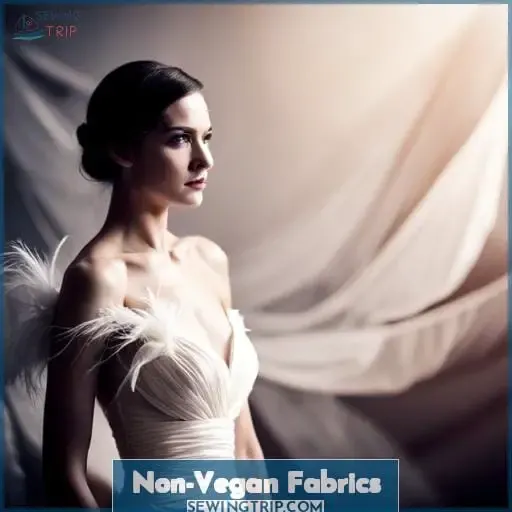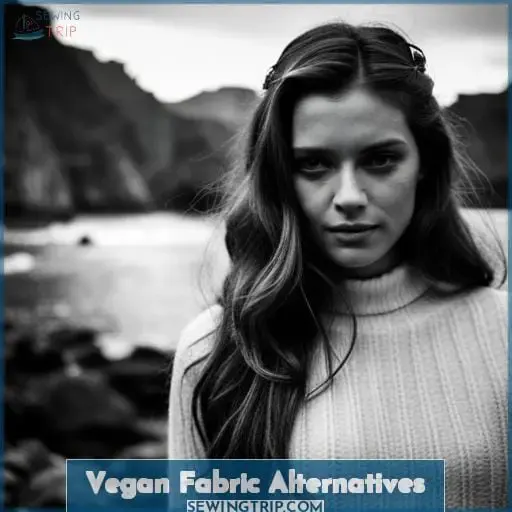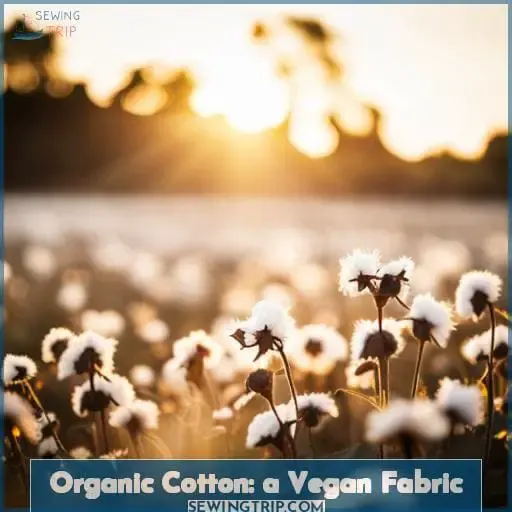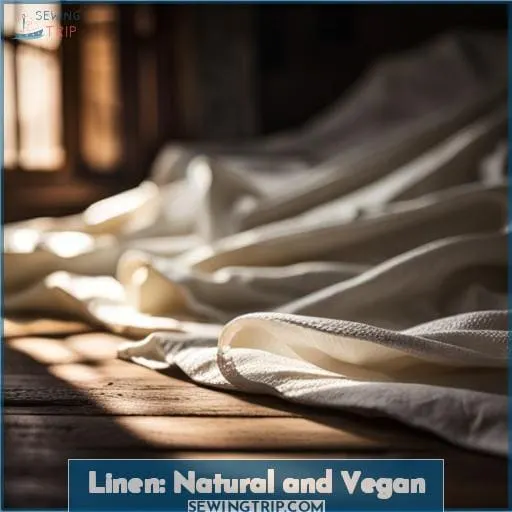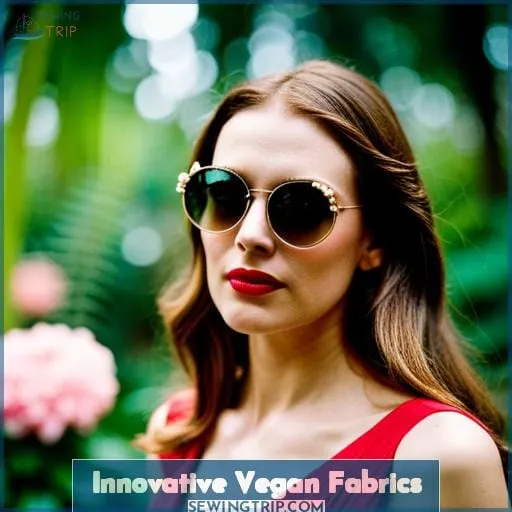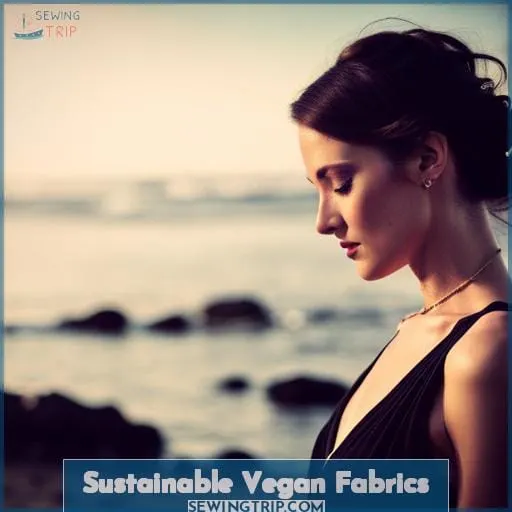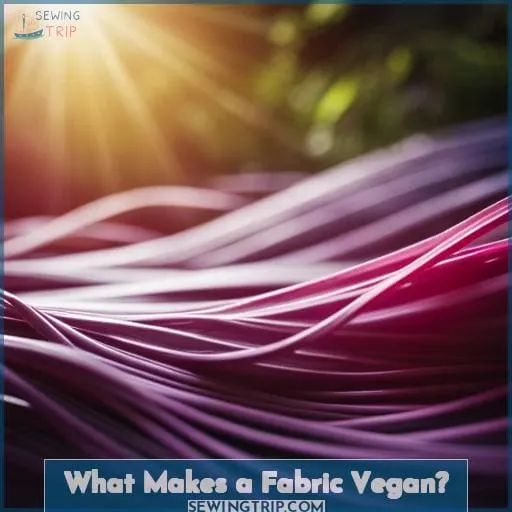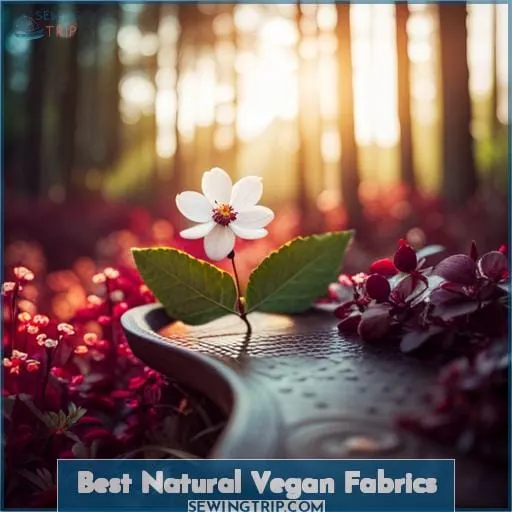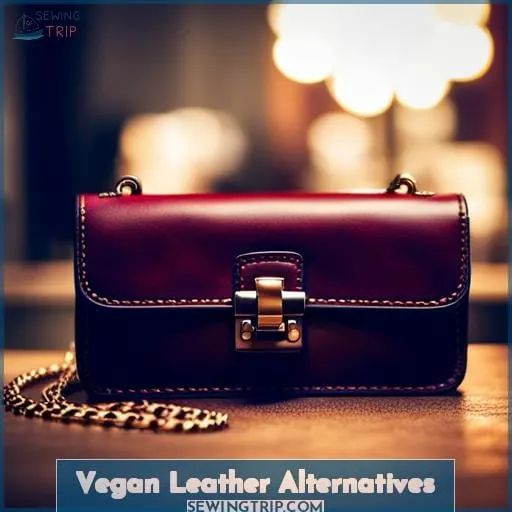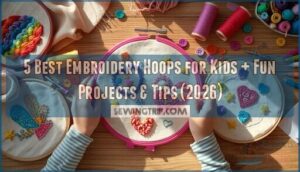This site is supported by our readers. We may earn a commission, at no cost to you, if you purchase through links.
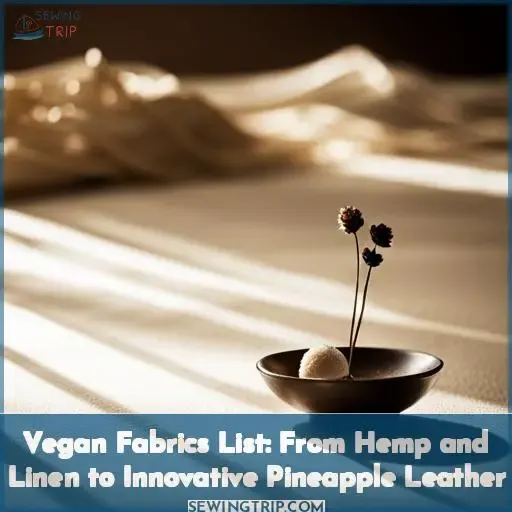
Hemp and linen feel soft, last long.
Innovations like cactus leather and pineapple leather skip the cruelty too.
Wear your values.
When we know better, we can all do better.
Table Of Contents
Key Takeaways
- Avoid animal-based fabrics like wool, silk, and leather due to cruel practices like mulesing, boiling silkworms, and skinning animals.
- Hemp, linen, organic cotton, and bamboo are excellent sustainable and vegan fabric options that are renewable, require fewer resources to produce, and enrich soil.
- Innovative vegan fabrics like seaweed, wood pulp, pineapple leather, and cactus leather offer durability and performance without harming animals or the planet.
- Fabrics like hemp, linen, and organic cotton are breathable, long-lasting, and skin-friendly while reducing environmental impact through their production.
Non-Vegan Fabrics
Before choosing your fabrics, you’re wise to avoid non-vegan options like wool, silk, and leather that require exploiting and harming animals.
As a sustainability expert advising fashion brands, I can’t endorse materials derived from the exploitation of animals.
Practices like mulesing sheep for wool, boiling silkworms, and skinning animals for leather and fur should be condemned.
More sustainable, innovative alternatives exist without cruel practices.
Fabrics from pineapple leather to cactus leather offer durability without harm.
Bamboo viscose and Tencel provide silk-like sheen ethically from plants.
Hemp and linen offer strength and breathability minus exploitation.
With smart, compassionate choices, we can produce high-quality textiles benefiting people, animals, and our shared environment.
Ethical consumerism aligned with social justice values paves the way.
Vegan Fabric Alternatives
From Hemp and Linen to Innovative Pineapple Leather:
You’ll be happy to know there are plentiful vegan fabric alternatives that don’t involve animal products.
These eco-friendly options include:
- Plant-based textiles like hemp, linen, and even pineapple leather.
- Synthetics like polyester.
Let’s explore some of the most innovative and ethical vegan fabrics that can truly transform fashion.
Plant-Based
You’re often choosing plant-based fabrics like cotton, linen, and bamboo as cruelty-free vegan alternatives.
As a textile engineer advocating for sustainable fashion, I encourage opting for hemp, linen, bamboo, and other eco-friendly plant-based textiles.
These renewable, biodegradable materials enable ethical wardrobe choices without harming animals.
By moving towards innovative plant-based fabrics like pineapple leather and seaweed fiber, together we can transform textile production methods to be greener and more compassionate.
Synthetic
From Hemp and Linen to Innovative ‘Pineapple Leather’:
In accordance with vegan principles, you’re selecting artificial fabrics like polyester and nylon that don’t derive from animals.
As a sustainability expert, you know synthetics have less environmental impact than animal-based textiles.
Still, opt for plant-based choices when possible, like hemp and linen.
The Fashion Revolution demands innovative textiles that are ethical and eco-friendly.
Sustainable fashion means liberation.
Organic Cotton: a Vegan Fabric
A Vegan Fabric subtopic:
Organic cotton, grown without chemicals, is an excellent vegan choice that’s soft and easier to clean than wool. It’s produced through sustainable farming practices that prioritize water conservation and minimize the environmental impact.
Here are five reasons why organic cotton makes a skin-friendly and chemical-free option for vegans:
- Sustainable Farming: Organic cotton is cultivated using methods that promote soil health while reducing water usage.
- Water Conservation: Compared to conventional cotton production, organic farming requires significantly less water.
- Skin-Friendly: Organic cotton fabric feels gentle against the skin due to its natural fibers free from harmful chemicals or pesticides.
- Chemical-Free: The cultivation of organic cotton avoids synthetic fertilizers, herbicides, insecticides commonly used in traditional farming practices.
- Environmental Impact: By choosing organic over conventional options like hemp or linen can make a positive difference in terms of sustainability.
Consider incorporating this eco-conscious fabric into your wardrobe for a truly compassionate fashion statement.
Linen: Natural and Vegan
Natural and Vegan subtopic:
As a textile expert advocating for sustainability, I understand linen offers exceptional durability that softens beautifully over time. Its breathable structure absorbs moisture while releasing it quickly to keep you cool.
With linen requiring fewer pesticides and fertilizers, it remains non-allergenic through eco-friendly cultivation.
| Benefit | Description |
|---|---|
| Durability | Withstands years of use |
| Breathability | Absorbs and releases moisture |
| Softness | Softer with washing |
| Sustainability | Fewer pesticides needed |
| Non-allergenic | Won’t trigger allergies |
Linen gives us a natural, vegan fabric that keeps us comfortable while protecting the planet. Its renewable cultivation and biodegradable nature check all the boxes for an ethical, eco-friendly textile.
Innovative Vegan Fabrics
Two intriguing vegan fabrics gaining interest are seaweed and wood pulp textiles.
Seaweed activates cell regeneration.
Wood pulp mimics qualities of conventional fabrics.
Both demonstrate inventive techniques for developing animal-free and eco-friendly alternatives that could transform fashion.
Seaweed
One innovative vegan fabric you’re made from is seaweed, which is produced by drying, crushing, and grinding seaweed into a cellulose fiber.
- Activates cell regeneration
- Re-mineralizes skin
- Limits inflammation
- Soothes itchiness
Biodegradable
Wood Pulp
You’re wearing wood pulp fabrics made from wood pulp through an eco-friendly process.
This innovative vegan fabric alternative is biodegradable, recyclable, naturally wrinkle-free, soft, and able to mimic qualities like silk, suede, and wool.
| Feature | Benefit |
|---|---|
| Biodegradable | Eco-friendly |
| Recyclable | Sustainable |
| Wrinkle-free | Easy care |
| Soft | Comfortable |
| Versatile | Mimics other fabrics |
Sustainable Vegan Fabrics
You’ll want to consider hemp and bamboo when seeking out sustainable vegan textiles.
Both fabrics are eco-friendly, biodegradable alternatives that don’t involve any animal products.
We’ll explore some of the benefits of these and other sustainable vegan options that are gentler on the planet.
Hemp
Another sustainable vegan fabric you’re likely familiar with is hemp.
As a textile expert passionate about sustainability, I’m thrilled to see hemp gaining popularity in fashion.
Compared to cotton, hemp requires less water, enriches soil, and captures carbon during growth.
Its durable fibers yield fashionable, ethical clothing with a lighter environmental footprint.
By choosing hemp garments, you support agricultural innovation and a greener supply chain.
With stylish hemp pieces increasingly available, vote for the planet whenever you get dressed!
Bamboo
And you’re likely familiar with bamboo as another sustainable vegan fabric option that’s renewable and biodegradable.
As a highly renewable resource, bamboo can be harvested every 3-5 years without needing replanting.
Its fibers yield soft, breathable fabrics that wick moisture well, and innovative bamboo textile products like yoga apparel and antimicrobial socks keep gaining traction.
Pairing bamboo with other eco-friendly vegan fabrics like hemp and linen creates cruelty-free textiles that follow emerging sustainability fashion trends.
What Makes a Fabric Vegan?
As we’ve seen, you’re looking at plant-based and synthetic materials when seeking out vegan fabrics.
To be considered vegan, a fabric can’t contain any animal-derived materials obtained through practices that exploit or harm animals.
This rules out common non-vegan fabrics like wool, silk, fur, leather, suede, feathers, and down.
Instead, focus on alternative plant-based textiles like hemp, linen, cork, jute, and innovative pineapple leather or cactus leather.
These eco-friendly vegan options have a more ethical impact, empowering consumers to make cruelty-free choices supporting sustainable fashion and progressive textile development.
By carefully selecting compassionate materials, fashion lovers can enjoy quality fabrics free from animal cruelty.
The future of ethical fabrics is bright.
Best Natural Vegan Fabrics
You should also consider jute and cork as excellent natural vegan fabric options.
Jute is a coarse, strong fiber made from the stems of a tropical plant.
Cork is a sustainable material harvested from the thick bark of cork oak trees.
Both fabrics are durable, biodegradable, and animal-free, making them smart vegan textile choices.
Jute
When choosing natural vegan fabrics, you’re looking at jute as one of the best options.
- Biodegradable and recyclable
- Breathable and comfortable
- Used for bags, rugs, fabrics
- Sustainably farmed
- Versatile eco-friendly uses
- Innovations improving global jute market
Cork
How sustainably can you produce cork fabric without trees or forests being damaged?
You’re choosing cork clothing and accessories because they’re entirely plant-based and renewable when properly harvested.
Cork oak trees thrive when their bark is periodically harvested, absorbing CO2 without being cut down.
The production of cork textiles empowers local artisans while preserving sensitive ecosystems.
| Advantages | Disadvantages |
|---|---|
| Renewable | Limited supply |
| Eco-friendly | Niche production |
| Ethical harvesting | Few manufacturers |
| Supports communities |
Vegan Leather Alternatives
Let’s explore some innovative alternatives to traditional leather materials.
Two examples of vegan leather alternatives are cactus leather and pineapple leather.
Cactus leather is made from the fibers of the prickly pear cactus, offering a sustainable and cruelty-free option for fashion products.
Pineapple leather, on the other hand, is derived from pineapple leaves and offers a durable yet eco-friendly alternative to animal-derived leathers.
These vegan options showcase how creativity can lead us towards more ethical and sustainable choices in fashion.
Cactus Leather
Having covered natural vegan fabrics, you’re now learning about cactus leather – a sustainable, cruelty-free alternative to animal leather.
The production process involves:
- Harvesting cactus leaves
- Removing the thorns
- Processing into fiber
- Dyeing and finishing into supple, durable cactus leather
As a renewable resource requiring little water and no chemicals, cactus leather aligns with fashion’s shift toward more eco-conscious materials.
Its durability and breathability lend well to shoes, bags, wallets, and clothing.
Pineapple Leather
After learning about cactus leather, you’ll be intrigued to discover pineapple leather – another innovative, sustainable alternative to animal-derived leather.
This cruelty-free material is made from pineapple leaf fibers and provides an ethical, environmentally-friendly option for fashion items and accessories.
As consumers increasingly demand sustainable textiles like these pineapple leather innovations, the industry shifts towards more compassionate, renewable plant-based materials over environmentally-taxing animal skins.
Choosing pineapple leather supports this movement towards cruelty-free, low-impact fabrics.
Fabrics to Avoid
You’ll want to avoid fabrics like wool, silk, and down.
These materials involve the exploitation and harm of animals, undermining sustainability efforts.
Let’s explore some thoughtful alternatives that are better for people, animals, and the planet.
Wool
When choosing fabrics, avoid selecting wool, which comes from the exploitation and slaughter of sheep.
- Requires painful procedures like mulesing.
- Alternatives exist like hemp, linen, and synthetic fabrics.
Make ethical, sustainable, animal-free textile choices.
Silk
After discussing wool, you’re now learning that silk is another non-vegan fabric to avoid.
This delicate fabric requires boiling silkworms alive in their cocoons to harvest the threads.
Consider sustainable silk alternatives like plant-based Tencel or innovative pineapple leather instead.
Choosing compassionate textiles allows you to align values with actions.
Down
You’ll also want to stay away from down, as the soft feathers are plucked from living geese and ducks.
Cruelly obtained for bedding and clothing insulation, this common material requires painful live plucking that causes wounds, fear, and suffering in birds.
However, sustainable, cruelty-free down alternatives exist, like hemp and linen batting for comforters and bamboo and tencel fiber pillow stuffing, providing eco-friendly, animal-friendly comfort.
Frequently Asked Questions (FAQs)
Can I wear used or secondhand non-vegan fabrics?
Yes, you can ethically wear used or secondhand non-vegan fabrics.
This prevents additional harm by avoiding directly supporting industries that exploit animals.
It’s an imperfect but practical way to reduce waste while aligning choices with values.
Focus instead on normalizing compassion through education and leading by example.
Are there certified vegan labels for fabrics I can look for?
Unfortunately, there are currently no universally recognized third-party certification labels for verifying vegan fabrics.
Your best option is to inquire with each brand about their supply chains and materials.
Select companies committed to ethical practices that avoid animal-derived textiles.
Is rayon considered a vegan fabric?
Yes, rayon is typically considered a vegan fabric.
Though derived from cellulose, modern methods use wood pulp or other plant-based sources without animal inputs.
As a semi-synthetic made from renewable materials, rayon offers a cruelty-free textile that tends to drape well and breathe comfortably against skin.
How do I clean and care for vegan fabrics?
When caring for vegan fabrics:
- Check the care label and follow washing or drying instructions.
- Use a gentle, eco-friendly detergent and wash in cool water.
- Line dry or tumble dry on low when possible.
- Handle garments with care and repair signs of wear to maximize longevity.
Where can I buy affordable vegan fabrics for sewing projects?
Unfortunately, I don’t have enough information to recommend specific places to buy affordable vegan fabrics.
However, researching online stores, thrift shops, fabric outlets, and craft markets in your area could uncover quality vegan textiles at reasonable prices for your sewing projects.
Creativity and an investigative spirit serve you well.
Conclusion
At the end of the day, going vegan with your fabrics is better for the planet and its inhabitants.
From hemp to recycled synthetics, the options to skip animal-derived materials are manifold.
With vegan leathers made of cacti and pineapples to linen dresses, you can easily dress to impress without supporting cruelty.
When we know better, we can all make kinder choices.
Simply put, wear your values.

